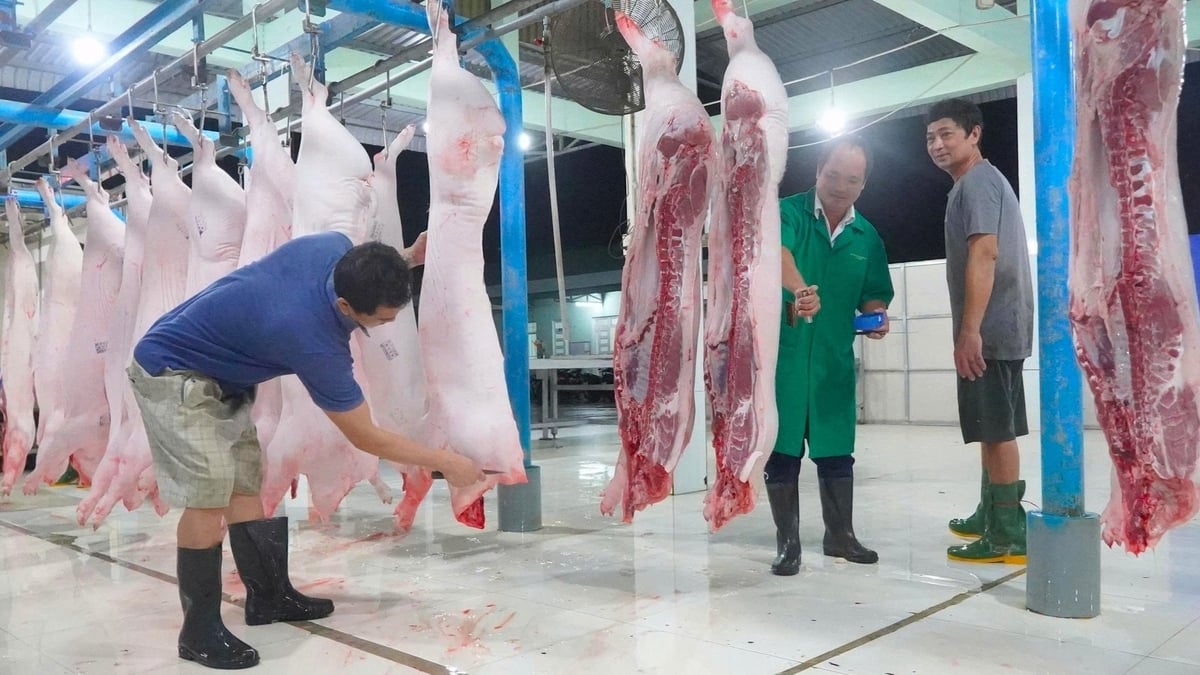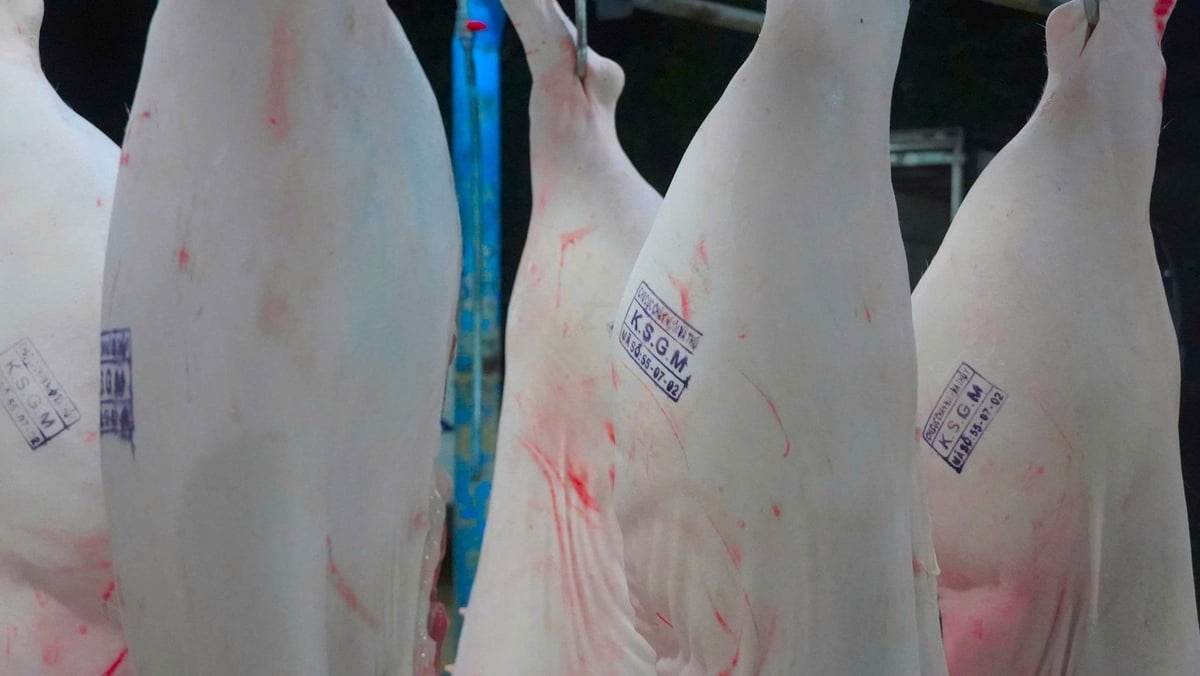December 21, 2025 | 22:10 GMT +7
December 21, 2025 | 22:10 GMT +7
Hotline: 0913.378.918
December 21, 2025 | 22:10 GMT +7
Hotline: 0913.378.918
Can Tho city currently has twenty-two concentrated slaughtering facilities, including seventeen for cattle and five for poultry. It is estimated that 1,579 poultry and 13,650 cattle are slaughtered every day on average. Animal products are mainly for local consumption and a small part of the output is consumed in some provinces adjacent to the city.

Veterinary staff and technicians inspect pork products after slaughter before supplying them to the market. Photo: Kim Anh.
Can Tho city has 110 traditional markets, with a total of 808 stalls selling animal products. To be more specific, 561 stalls sell pork, 172 stalls sell poultry meat and 75 stalls sell buffalo, beef and goat meat. This city also has 8 large supermarkets, 136 mini supermarkets, 7 Fresh Shop CP stores, and 10 cold storage facilities for imported animal products.
Information from Can Tho City Department of Livestock Production and Animal Health shows that all slaughterhouses, markets, supermarkets and stores selling animal products in the area are regularly inspected for compliance with regulations on quarantine, slaughter control and veterinary hygiene. The functional sector has developed and implemented many action plans to ensure food safety.
In addition to the monthly periodic inspection plans and peak inspections before, during and after the Lunar New Year 2025, Can Tho City Department of Livestock Production and Animal Health has issued Plan No. 210/KH-CCCN&TY dated April 18, 2025 on “Ensuring food safety and improving the quality of agricultural products in the field of animal husbandry and veterinary medicine in 2025”.
Specialized inspection work for the second quarter of 2025 is now being implemented, focusing on three main contents: animal quarantine, slaughter control, and veterinary hygiene inspection. Violations in this field will be strictly handled according to the law, with the coordination between the Department of Livestock Production and Animal Health and the Inspectorate of the Department of Agriculture and Environment.

Pork that has passed inspection is stamped with quarantine confirmation before being put on the market. Photo: Kim Anh.
At a large-scale pig slaughterhouse in Thot Not district (Can Tho city), the slaughtering process is carried out professionally and strictly in every step. Every night, this facility slaughters 180 - 200 pigs, equivalent to approximately 18 tons of meat. The products mainly serve the Can Tho market and are processed for C.P. Vietnam Livestock Joint Stock Company.
“Pigs are bathed before being slaughtered by electrocution, which helps reduce pain. They are sourced from local and foreign farms and are thoroughly inspected by veterinary staff upon entering the slaughterhouse. Any pig showing signs of illness will be quarantined to prevent the spread of the disease. Veterinary staff are on duty 24/7 to monitor, inspect and stamp products for safety and quality control,” said Truong Van Hang, manager of the slaughterhouse.
A facility located in Cai Rang district is also known for maintaining strict procedures. Every day, this facility slaughters 150 pigs, providing roughly 10 tons of meat to the market. As stated by Nguyen Thanh Vu, the owner of the facility, pigs are isolated for 6 - 8 hours before slaughter to stabilize and facilitate clinical examination. Pigs showing signs of weakness or illness are transferred to a separate isolation area. Those with serious illnesses will be buried 500 m away from the slaughterhouse, ensuring no impact on the environment and no spread of disease.

Veterinary staff are on duty 24/7 to perform inspections as per regulation and control the number of pigs entering and leaving the slaughterhouse. Photo: Kim Anh.
According to a representative of Can Tho CIty Department of Livestock Production and Animal Health, tightening control, from the breeding, slaughtering to distribution stages, not only aims to ensure food safety, but also helps raise awareness and responsibility of organizations and individuals participating in the food production and supply chain.
In the near future, Can Tho city will continue to strengthen inspection and supervision, and at the same time encourage slaughterhouses to further invest in upgrading infrastructure, applying humane slaughtering procedures and standard waste treatment. The functional sector will also promote inter-sectoral coordination in food safety management with the aim of building a transparent and safe animal food system to serve consumers.
Translated by Samuel Pham

(VAN) The 2025 Joint Response Plan (JRP) identifies three core priorities and calls for $96.2 million to support disaster recovery for 1.4 million people.

(VAN) Risk assessment methodology enables early risk identification, rational resource allocation, and the development of control measures tailored to the food value chain.

(VAN) Once considered a waste product to be burned, rice straw in the Mekong Delta is now being collected and processed through mechanization and biotechnology, paving the way for a sustainable circular agricultural model.

(VAN) Risk assessment in food safety management not only helps protect public health but also promotes sustainable development.

(VAN) Prime Minister chaired the 26th meeting of the National Steering Committee on Illegal, Unreported, and Unregulated (IUU) Fishing.

(VAN) Cuba is currently streamlining procedures to attract investors, with many new policies shaped by the practical experiences of Vietnamese projects operating in the country.

(VAN) Patrol Team No. 15 has been executing patrol, inspection, and control duties in the Southwest waters, a region identified as having a high risk of violations.